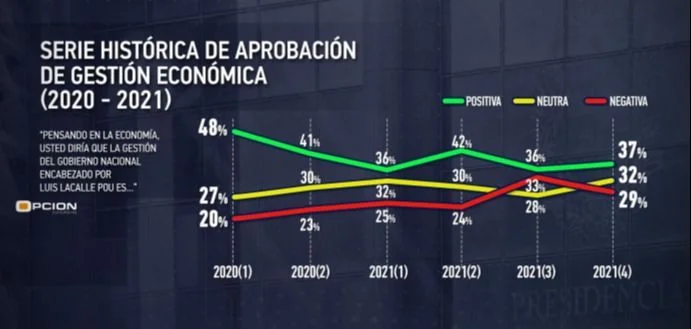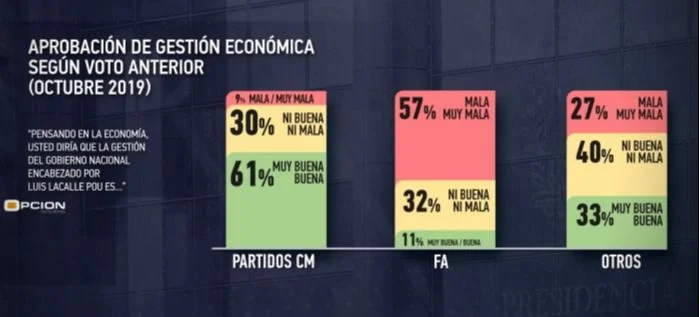The 37% of Uruguayans approve the economic management of the government and the 28% He disapproves of it, so the approval balance is eight points in a context of predominant stability, according to Opción based on a new survey released this Thursday in Telenoche (Channel 4).
In the consultation, which corresponds to November, a 32% which classifies management as “Neither good nor bad”, and 2% do not know or do not answer.
The 2021 trend shows predominantly stable, with an approval peak registered in the second quarter and with three quarters around 36% -37% approval.
Government financial discharge approval – November 2021
The second half of 2021 consolidated a post-pandemic climate of public opinion, in which economic demands and expectations definitively displaced health concerns related to the Covid-19 crisis. Topics like unemployment, wages, rates and poverty predominate among the main concerns of Uruguayans, and are heading to have a growing weight in the relationship between citizens and the government, indicates the consultant.
Compared to 2020, the percentages of economic discharge approval were lower in all the quarters of 2021, a trend similar to what happened with the government approval. It could be said that, as with the general management, the financial approval has been behaving as it usually does: with a ceiling registered in the “honeymoon” period, explains Option.

Historical series of economic discharge approval (2020-2021)
As expected, the government’s economic management strongly divides the ruling and opposition electorates. The percentage that approves the economic administration is about six times higher among the voters of the governing coalition parties than among the Frente Amplio (61% to 11%).
Conversely, the front amplifiers that qualify as bad or very bad economic management six times higher than multicolored (57% versus 9%).

Financial management approval according to previous vote (October 2019)
However, What is the main factor responsible for the economic problems that the country is going through? For half of Uruguayans, these problems are mainly due to the global economic effects of the health crisis.
Meanwhile, 22% fundamentally blame the previous government and 19% the current government. These are trends similar to those of previous quarters. Therefore, it is concluded that, despite the fact that Uruguayans maintain a negative diagnosis about the current situation of the economy, the clear majority continue to attribute responsibility to causes beyond the current management.
Another relevant conclusion is that the levels of favorable evaluation of the economic management of the current government are clearly lower than their figures of general approval. Currently, there is a difference of 14 points between both types of approval (51% versus 37%). Therefore, although the public does not attribute responsibility to the government for the economic problems that the country is going through, they are less enthusiastic when evaluating its economic management than when making a global judgment about its work.
An additional factor that could help explain the gap between economic management and general management is the approval of public security discharge, whose approval levels grew strongly in this government cycle.
Thinking about the future, if the pandemic continues in retreat or with very controlled numbers as it is today, a greater convergence between economic discharge and general discharge could be observed, to the extent that the first will have a more decisive impact on the second.
For the government, this will mean good news if the economic indicators continue on the path of frank recovery and will pose new challenges if there is a slowdown, adds Option.
“All of this, in turn, may have relevant consequences on the referendum on the LUC given that, as has already been stated in previous reports, the general relationship between citizens and government at the time of the vote will be one of the keys to the outcome of the contest, “the report concludes.
The query was made between October 29 and November 8, 800 people over 18 years old, resident in Uruguay. They were telephone questions. The report has a maximum margin of error of +/- 4.1% for a confidence level of 95%, informs the consultant.


















